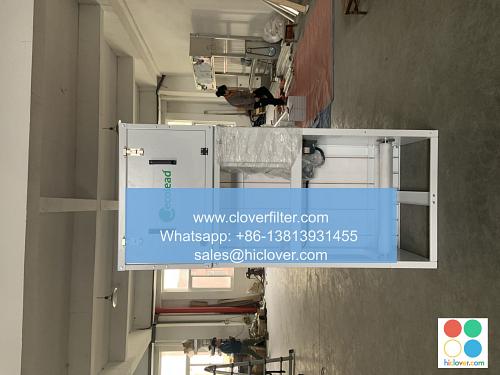A Comparison of Automatic Roll Filters and Traditional Air Filters in Biotech Labs

The biotech industry relies heavily on maintaining a sterile and controlled environment, particularly in laboratories where sensitive experiments and procedures are conducted. One crucial aspect of achieving this environment is the use of efficient air filtration systems. In this article, we will compare and contrast automatic roll filters and traditional air filters, highlighting their respective advantages, disadvantages, and application areas in biotech labs.
Introduction to Air Filtration in Biotech Labs
Biotech labs require precise control over temperature, humidity, and air quality to ensure the integrity of experiments and the safety of personnel. Air filtration systems play a vital role in removing airborne contaminants, such as particles, bacteria, and viruses, which can compromise the sterility of the environment. The choice of air filter can significantly impact the efficiency and effectiveness of the lab’s operations.
A Comparison of Automatic Roll Filters and Traditional Air Filters
Automatic roll filters and traditional air filters are two types of air filtration systems commonly used in biotech labs. While both types of filters can provide effective air purification, they differ significantly in terms of their design, operation, and maintenance requirements.
Automatic Roll Filters
Automatic roll filters are designed to provide continuous, uninterrupted air filtration. These filters feature a roll of filter media that automatically advances to a new section as the previous one becomes saturated, minimizing downtime and maintenance. The benefits of automatic roll filters include:
* Reduced labor costs associated with frequent filter replacements
* Increased filtration efficiency due to the continuous replacement of filter media
* Improved air quality and reduced risk of contamination
* Compact design, making them ideal for use in laboratories with limited space
However, automatic roll filters can be more expensive to purchase and operate than traditional air filters. Additionally, the filter media may need to be replaced more frequently, depending on the level of air pollution and usage.
Traditional Air Filters
Traditional air filters, on the other hand, are designed to capture airborne contaminants using a fixed filter media. These filters require regular maintenance, including inspection, cleaning, and replacement of the filter media. The advantages of traditional air filters include:
* Lower upfront costs compared to automatic roll filters
* Wide range of filter media options available, allowing for customization to specific lab requirements
* Can be used in conjunction with other air purification systems, such as HEPA filters and UV lamps
However, traditional air filters have some significant drawbacks, including:
* Increased labor costs associated with frequent maintenance and replacement
* Risk of contamination and compromised air quality if filter media becomes saturated or is not replaced regularly
* May require more space than automatic roll filters, depending on the design and size of the filter
Application Areas in Biotech Labs
Both automatic roll filters and traditional air filters can be used in various application areas in biotech labs, including:
* Laminar flow cabinets: Automatic roll filters are often used in laminar flow cabinets to provide a sterile work surface for sensitive experiments.
* Cell culture rooms: Traditional air filters are commonly used in cell culture rooms to maintain a controlled environment and prevent contamination.
* Biosafety cabinets: Automatic roll filters can be used in biosafety cabinets to provide an additional layer of protection against airborne contaminants.
* PCR labs: Traditional air filters can be used in PCR labs to prevent contamination and maintain a controlled environment.
Conclusion
In conclusion, the choice between automatic roll filters and traditional air filters in biotech labs depends on various factors, including the specific application area, lab requirements, and maintenance capabilities. While automatic roll filters offer the advantages of continuous air filtration and reduced maintenance, traditional air filters provide a cost-effective and customizable solution. By understanding the strengths and weaknesses of each type of filter, lab managers and technicians can make informed decisions to ensure the highest level of air quality and sterility in their biotech labs. Ultimately, the use of efficient air filtration systems is crucial for maintaining a controlled environment, ensuring the integrity of experiments, and protecting the safety of personnel in biotech labs.
Key words: Automatic roll filters, Traditional air filters, Biotech labs, Air filtration systems, Laminar flow cabinets, Cell culture rooms, Biosafety cabinets, PCR labs.

